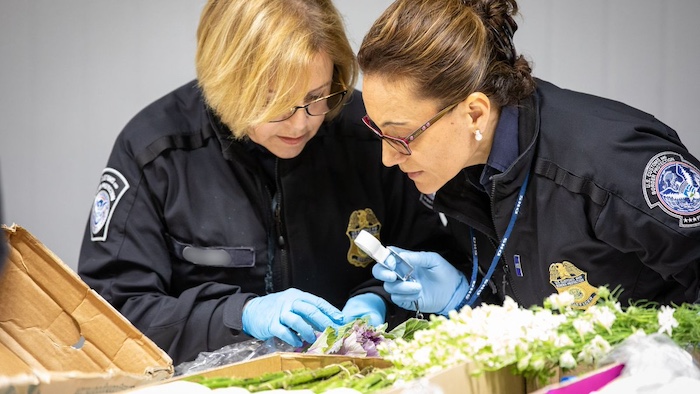Chrysanthemums, murraya not permitted at passenger ports of entry
SAN DIEGO — Valentine’s Day is just around the corner. U.S. Customs and Border Protection agriculture specialists are busy working at U.S. ports of entry to ensure that flower imports are free from pests and diseases that could harm the agriculture and floral industry of the United States.

“Protecting the integrity of our floral and agriculture industry from invasive pests and diseases is a top priority for CBP,” said Sidney Aki, CBP Director of Field Operations for San Diego. “If encountered, these pests and diseases can have a severe impact on the economic vitality of our floral and agriculture industry within the U.S.”
Chrysanthemums from Mexico are prohibited through the passenger ports of entry. Travelers cannot bring arrangements with these flowers into the country. With the current restrictions, CBP is trying to prevent fungi, such as chrysanthemum white rust from entering the United States. Chrysanthemum white rust is caused by the fungus Puccinia horiana P. Henn. If established in the U.S., this plant disease has the potential to have an extremely damaging impact on our agriculture and floral industry. To learn more about this type pf plant disease, visit Chrysanthemum White Rust.
Additionally, some cut greenery, which are the plants used to fill a bouquet, may have pests or diseases. For example, murraya (common name “orange jasmine”) is a host for Asian citrus psyllid, a dangerous pest found in citrus. If any portion of a bouquet has pests, the entire bouquet will be confiscated upon entry into the United States.
Roses, carnations, and many other flowers are allowed into the United States after they pass inspection. However, plants potted in soil cannot be brought from Mexico. Travelers must declare all flowers and plants to CBP officers.
If the bouquet a traveler declares has prohibited flowers and greenery, it will not be allowed. Travelers can avoid possible penalties by ensuring that they declare the bouquet. If the bouquet has no prohibited items, CBP agriculture specialists will inspect the cut flowers and greenery for pests and diseases. If CBP agriculture specialists do not discover any pests or diseases, the traveler will be allowed to keep the bouquet.
CBP encourages travelers to declare all agricultural items to a CBP officer upon arrival to avoid penalties. Travelers should not attempt to bring fruits, vegetables, or meats into the United States without first confirming they are permitted. Raw eggs and poultry from Mexico are prohibited and will be confiscated at the port. For more information, travelers may visit the Bringing Agricultural Products into the United States section of the CBP website.
CBP officers at the border crossing in Southern California stop illegal activity while processing millions of legitimate travelers into the United States. Those statistics can be found here: CBP-enforcement-statistics



















